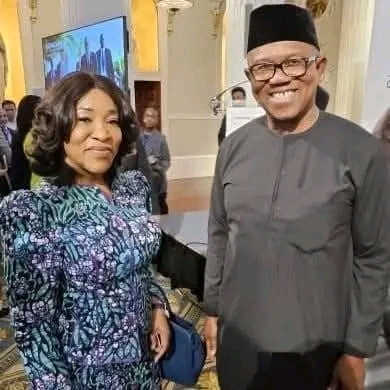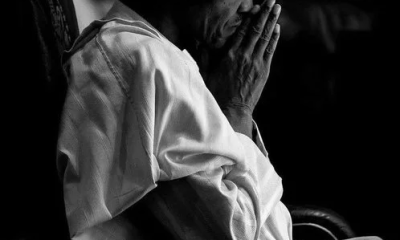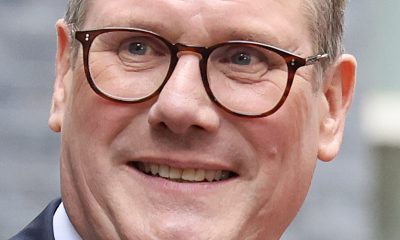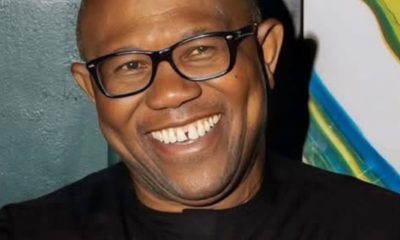FOREIGN NEWS
Obi Offers Africa a Lifeline Amidst Trump Trade Uncertainty At London Summit

Labour Party Presidential Candidate in 2023, Peter Obi, has delivered a compelling address at the Commonwealth Enterprise and Investment Council (CWEIC) Trade and Investment Summit in London, urging African nations to take proactive measures to mitigate the potential consequences of trade tariffs imposed by the United States under President Donald Trump.
Speaking at the plenary session titled “Africa’s Role in the New Global Economy,” Obi emphasised the critical need for investment in Africa’s rapidly growing youth population in order to develop a skilled workforce capable of propelling both continental and global development.
The summit, which brought together business leaders, policymakers, and investors from across the Commonwealth, provided an important forum for discussing the changing global economic landscape and its implications for emerging economies.
Attendees responded strongly to Obi’s speech, especially given their concerns about the resurgence of protectionist trade policies.
“The discussion on Africa’s Role in the New Global Economy is a topic of immense importance given the opportunities and endless potentials within the vast continent of Africa,” Obi stated, emphasising the continent’s transformative potential that remains untapped.
He emphasised that, if fully realised, these opportunities could have a significant positive impact not only on the Commonwealth economy, but also globally.
Obi directly addressed concerns about President Trump’s trade policies. “President Trump’s recent interventions have disrupted some of the settled assumptions of the global economy, resulting in many countries taking proactive and active responses to secure their economies, whereas the same is not currently happening in Africa,” he observed.
He warned that a lack of active response would expose the continent to economic shocks.
Despite having vast natural resources and a young population of nearly 1.5 billion, Africa’s current share of global trade remains stubbornly low, hovering around 2-3%, a figure mirrored by its contribution to global GDP.
Obi contrasted Africa’s stagnation with Asia’s robust growth, arguing that the continent must take a more proactive and strategic approach to capitalising on existing and emerging trade opportunities.
“While Africa did not experience a similar economic transformation during globalisation 2.0, we must rise up and take the necessary steps to ensure that we can profit from whatever trading system emerges in the aftermath of the second Trump presidency,” Obi declared. He proposed a concrete solution.
“Africa can achieve this by simply investing in its potential – the youthful human capital of over a billion workers – in order to create the skilled workforce and productivity required for both African and global development.
Beyond human capital, Obi emphasised Africa’s agricultural sector’s untapped potential, predicting a market value of more than $1 trillion by 2030.
He envisions a future in which Africa becomes a global agricultural powerhouse and a net food exporter, significantly contributing to the emerging global economy.
This transformation, however, is dependent on strategic investments and policy reforms.
“What is missing is leadership that can reorder priorities and increase productivity so that African countries can enter higher grade value creation,” Obi emphasised.
He advocated for a fundamental shift in focus towards productivity, innovative education, and strong healthcare systems, claiming that these investments are critical to lifting Africans out of poverty and allowing the continent to effectively leverage existing global trade agreements.
Obi’s address was more than just a critique of the current situation; it was also a call to action. He concluded by calling for transformative change and new leadership in Africa, emphasising the importance of rapid improvements in productive capacities, particularly in education and healthcare.
“This is the time to rebuild African economies under new leadership that focusses on rapid improvements in productive capacities, particularly innovative education and healthcare, and lifting Africans out of poverty.”
The speech has already received widespread attention from economists and political analysts, who see Obi’s recommendations as a critical road map for African countries navigating a potentially volatile global trade environment.
His emphasis on human capital and agricultural development is particularly relevant, as it provides a path to long-term and inclusive economic growth.
The CWEIC Trade and Investment Summit runs until Friday, with sessions on infrastructure development, sustainable finance, and the role of technology in driving economic growth across the Commonwealth.
Peter Obi’s speech has undoubtedly set the tone for an important discussion about Africa’s role in shaping the future of the global economy.
-
CRIME3 years ago
PSC Dismisses DCP Abba Kyari, To Be Prosecuted Over Alleged $1.1m Fraud
-
FEATURED4 years ago
2022 Will Brighten Possibility Of Osinbajo Presidency, Says TPP
-
FEATURED2 years ago
Buhari’s Ministers, CEOs Should Be Held Accountable Along With Emefiele, Says Timi Frank
-
BUSINESS & ECONOMY2 years ago
Oyedemi Reigns As 2023’s Real Estate Humanitarian Of The Year
-
SPORTS2 years ago
BREAKING: Jürgen Klopp Quits Liverpool As Manager At End Of Season
-
SPORTS2 years ago
Could Liverpool Afford Kylian Mbappe For €200 million? Wages, Transfer Fee
-
ENTERTAINMENT2 years ago
Veteran Nigerian Musician, Basil Akalonu Dies At 72
-
FEATURED2 years ago
Tribunal Judgement: Peter Obi Warns Of Vanishing Electoral Jurisprudence, Heads To Supreme Court
-
BUSINESS & ECONOMY2 years ago
Oyedemi Bags ‘Next Bulls Award’ As BusinessDay Celebrates Top 25 CEOs/ Business Leaders
-
FEATURED3 years ago
2023 Presidency: South East PDP Aspirants Unite, Demand Party Ticket For Zone


































